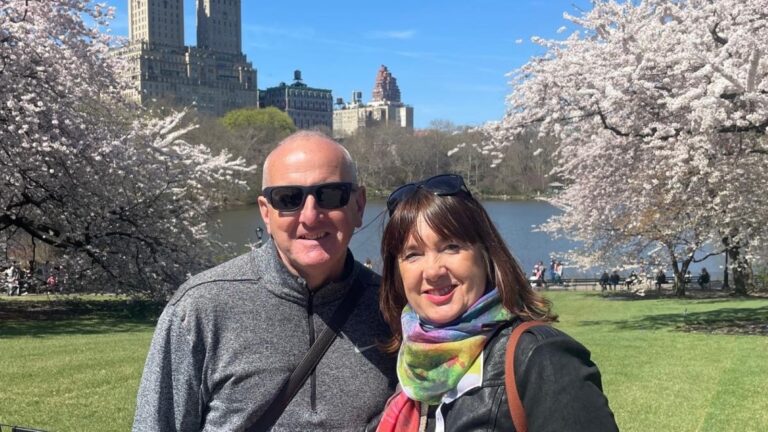
After years at the helm of Kettlewell Fuels, a well-respected independent distributor based near Ripon, North Yorkshire, Janet Kettlewell made the decision in 2021, to sell the business she and her husband, Trevor, had built with care, a strong community focus, and professionalism.
Two and a half years on, Janet sits down with Fuel Oil News to reflect on the decision, the sale process, the emotional journey, and the freedom that came after. For many fellow distributors considering their own future, her story offers honesty, practical advice, and a reassuring picture of what life can look like after letting go.
The decision to sell
What led you to consider selling?
“The decision to sell really began as a thought process triggered after we came out of COVID-19. It made us reevaluate our lives and think about life without the day-to-day responsibilities of running the business.”
Janet explains that she and Trevor had long been deeply involved in every facet of the operation – from customer service to delivery – and began to imagine a life beyond fuel. The pandemic brought a rare moment of reflection, prompting some big questions about quality of life.
“We were proud of what we built – successful, well-respected and professionally run with a high community standing – but it came at a cost. At times, it felt like being a hamster on a treadmill.”
Age and stage of life were naturally part of the consideration, but so too were industry changes. The increasing need to pivot, diversify or scale to compete in a changing energy landscape and consolidating market raised difficult questions.
“At this stage in our professional and personal lives, we decided we did not wish to pursue those changes.”
Importantly, they also knew their children weren’t looking to join the business, and with the company in a strong position, they felt it was the right moment to pass it on while ensuring its values endured.
Was selling always part of your long-term plan?
“Selling was not part of our long-term plan, but over time, we recognised the need to bring new people in to push the business forward.”
With these fresh perspectives came the realisation that a sale might be the best way to secure the company’s future.
How did you determine the right time to sell?
“There wasn’t a conscious decision; it was more of an organic process. We felt that it was the right moment when we were ready to pursue a life away from running a business.”
Whilst it was an unexpected pathway to take, what followed was a 12-month process that started from a seed of an idea and blossomed into a carefully managed exit.
Getting sale-ready
How did you prepare the business for sale?
“We limited knowledge of our decision to sell to a very small number of people, to ensure the business continued to operate effectively.”
With no idea what the outcome would be, Janet knew that controlling information and communication was key to preventing any distorted messaging.
Janet likens the process to preparing a house for sale – ensuring everything was presented professionally and transparently. To ensure that potential buyers truly understood the business, they put together a well-presented package, showcasing not just data, but their community-driven marketing activities and values.
Did you work with external advisors?
“Yes, we chose to work with a specialist advisory firm. We interviewed several to find those who shared our values.”
Their existing accountants and legal teams, who already knew the business inside out, played a crucial role. The decision to bring in an external advisory firm helped create emotional distance, allowing Janet and Trevor to navigate the process “at arm’s length” and focus on running the business while managing the sale.
How did you determine the value?
Rather than naming a price upfront, Janet and Trevor explored strategic conversations with potential buyers. The business attracted multiple offers, and the decision ultimately came down to the best fit.
“We secured the best offer from a company that would be the right fit, prioritising a local buyer to maintain the company’s local values and connections.”
Inside the sale process
How did you find potential buyers and what were the challenges?
“We created a realistic list of potential buyers that included a mix of large national and regional companies.”
While fortunate to receive strong offers, time became the biggest challenge. The dual pressures of running the business and meeting sale deadlines made time management – and flexibility – essential. An agreed timeline is important, but being prepared for tasks to take longer than anticipated is more so.
What about due diligence? Any surprises?
“The due diligence process went very smoothly for us.”
With the right advisors in place, and a well-organised sale pack, the process was stress-free. However, managing internal communication was the most sensitive issue.
“We wanted to ensure that our staff didn’t find out before we could officially inform them; it was crucial to us that they heard from us first.”
The emotional shift
How did it feel when the deal completed?
“We were emotionally prepared. Once it was done, Trevor and I looked at each other and decided to head to the pub for dinner.”
The moment itself was quiet, almost anti-climactic, but filled with a sense of satisfaction and an excitement for the next chapter.
“I felt satisfied knowing we had remained true to ourselves and the process and that the company could continue its onward journey.”
What was the hardest part emotionally?
It wasn’t letting go of control. For Janet, that came easily. It was telling people.
“We arranged for all the vehicles to return to the office at a specific time to ensure the drivers were informed alongside their office-based colleagues.”
“We made every effort to personally inform as many people as possible, including customers, suppliers and industry colleagues.”
They made personal phone calls to customers, suppliers, and colleagues in the industry. It was important to them that the news came from them – not from a press release.
Any regrets?
“No. The chapter was closed.”
After the handover
What was the transition like?
“We had a very short transition period. The handover was swift, mainly due to the preparation that took place during the sale process.”
With a buyer who was local, experienced and highly respected, the transfer was smooth and swift. Two days after completion, Janet and Trevor were on a flight to Las Vegas to see Adam Lambert – marking their first holiday free of business responsibilities.
How did customers and staff react?
There was shock, of course, and concerns for the future, but also a lot of goodwill.
“Without exception, every one of them wished us well.”
Janet and Trevor did all they could to support staff into roles with the new owners or elsewhere while the personal engagement with long-standing customers gave them every reason to remain with the company under its new ownership.
And now?
“Life has been a wonderful adjustment.”
Janet has embraced hobbies, travel, family time, and new friendships. There’s no business venture on the horizon, though she hasn’t ruled out voluntary work.
More than retirement
It’s worth noting – Janet doesn’t view this as retirement, rather a new chapter.
“To me, it is more a sense of freedom.”
For someone who spent decades in a business where every waking hour was in some way linked to operations, staffing, delivery schedules and even the weather, the shift has been profound.
“Bizarrely, one of the most noticeable shifts has been my relationship with the weather. I can go days without giving it a second thought!”
Another joy? Spontaneity.
“A privilege taken for granted by many, I’ve embraced it as an unexpected bonus.”
Advice for others
What would you say to others considering selling?
“Be prepared! Maintain your credibility. Think through the consequences and have a post-sale plan in place, but don’t overthink the process.”
Reassuringly, Janet notes that while those considering this route should “expect the unexpected” they found the challenges along the way to be “mostly manageable and easily overcome”.
Her biggest advice? Know yourself. Selling a business isn’t just financial – it’s deeply emotional. This is especially true for those running a family or legacy business who may feel a sense of guilt at the thought of transferring the business into new hands.
“Once you decide to sell, it’s a firm decision, and there’s no going back.”
Acknowledging the demands of running a fuel distribution business where “everything starts and finishes with you” Janet suggests that the fear of what life will hold after the business is gone may be a barrier to selling.
“If the thought of moving into the next phase fills you with anxiety, then maybe you’re not ready. The emotional decision to let go comes first.”
In terms of planning for life afterwards, Janet’s recommendation is to have some plans in place, but to remain open and flexible to allow for the surprises along the way.
While she misses the people and the industry community, Janet describes life as a series of chapters. Life since fuel distribution is simply the next exciting chapter, and one in which there are certainly no regrets for Janet – only the opportunity to embrace new passions, like photography, and exciting travels. Following our conversation, Janet was planning to complete her preparations for an upcoming trip to India in search of wildlife to capture through her lens.
Final thoughts?
“Life is what you make it. And that’s the case when you are at the helm of a business and giving it your all to make it the best it can be, and it is also the case after you’ve stepped away into your new chapter.”
Janet suggests that the personal values that contribute to business success are the same that should be used throughout the sale process and in the post-sale life.
With the deep involvement Janet had in the industry – including a wonderful tenure as UKIFDA President – some of you may be wondering whether Janet still keeps one foot in the fuel world.
Earlier this year, she donated her wardrobe of bright, stylish workwear to a Leeds charity supporting women re-entering employment.
“If ever there was any doubt whether I’d left my previous chapter behind, that puts it firmly to bed.”
Now often to be seen donning the more muted tones of a wildlife photographer, Janet’s clothing may have toned down – but her life, it seems, is more vibrant than ever.
Image supplied by Janet Kettlewell
